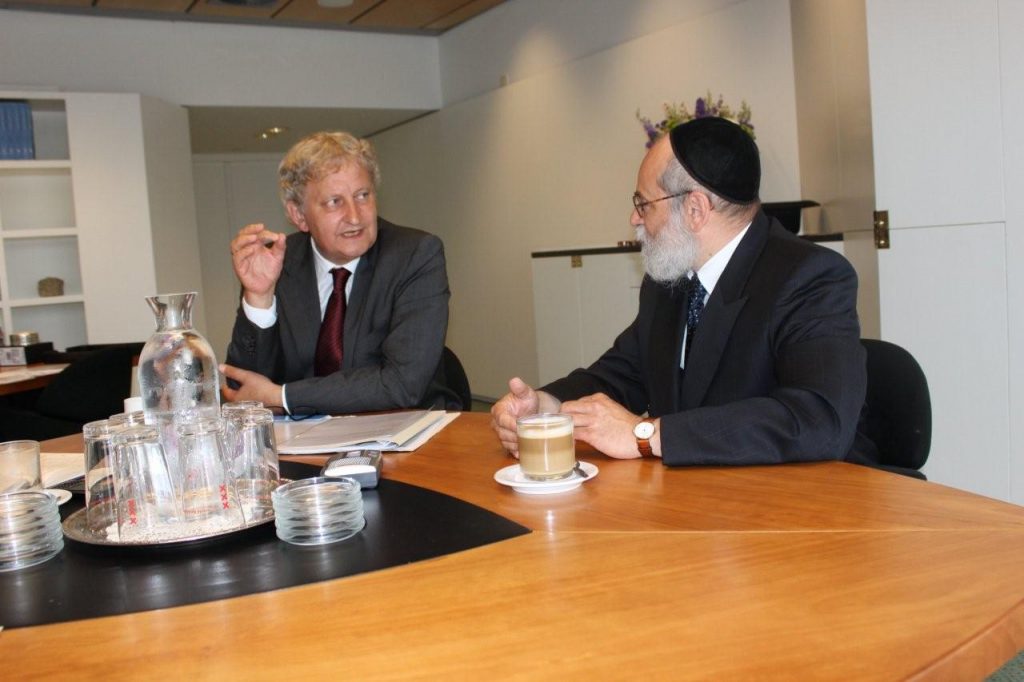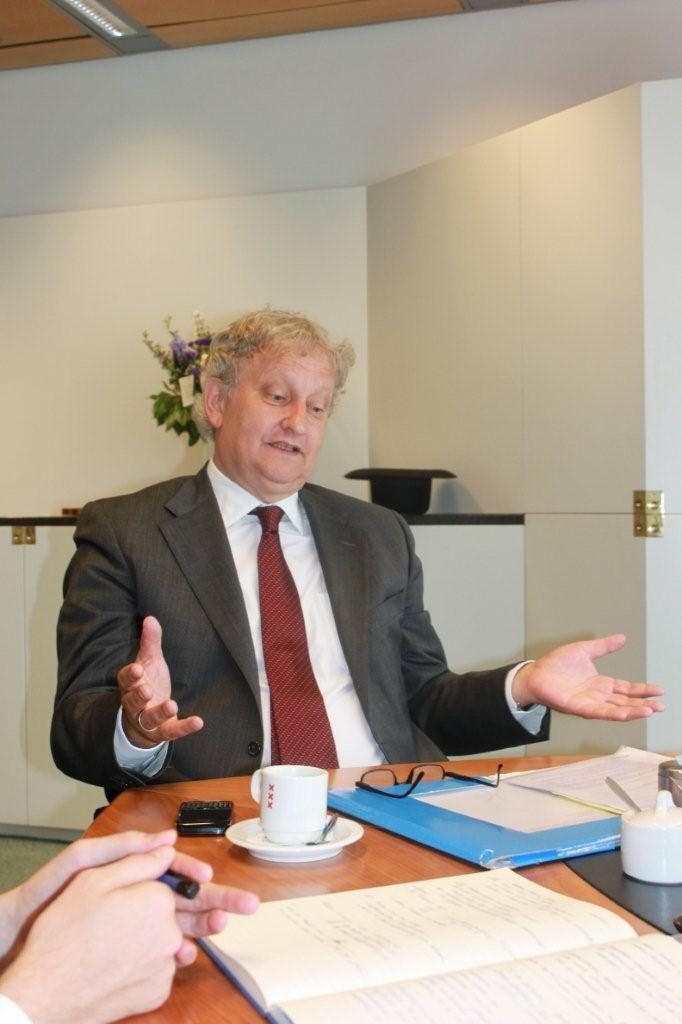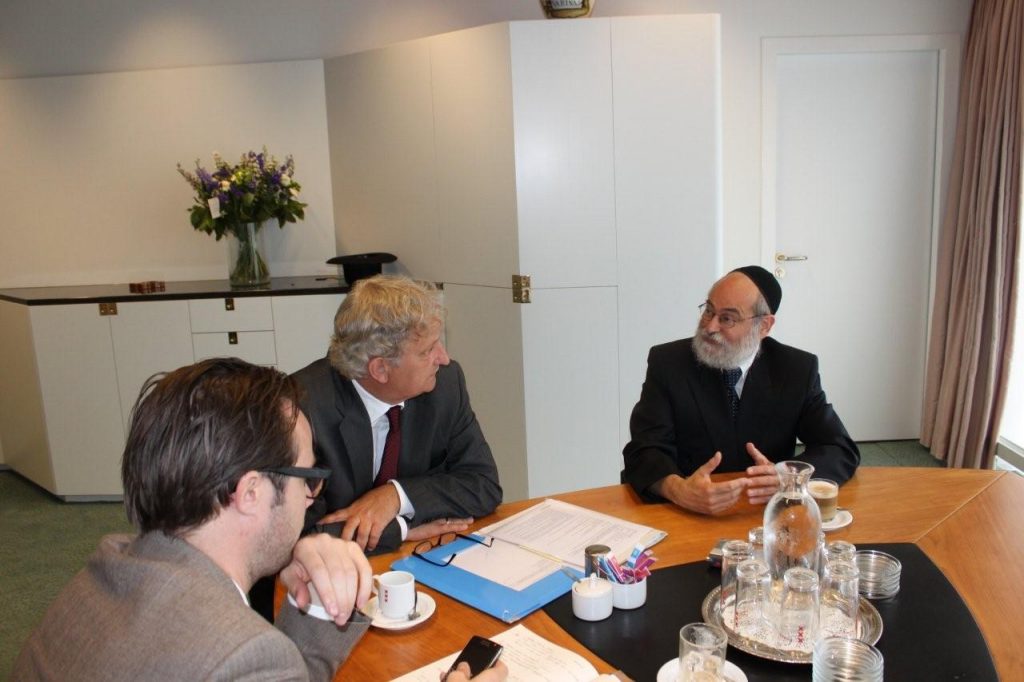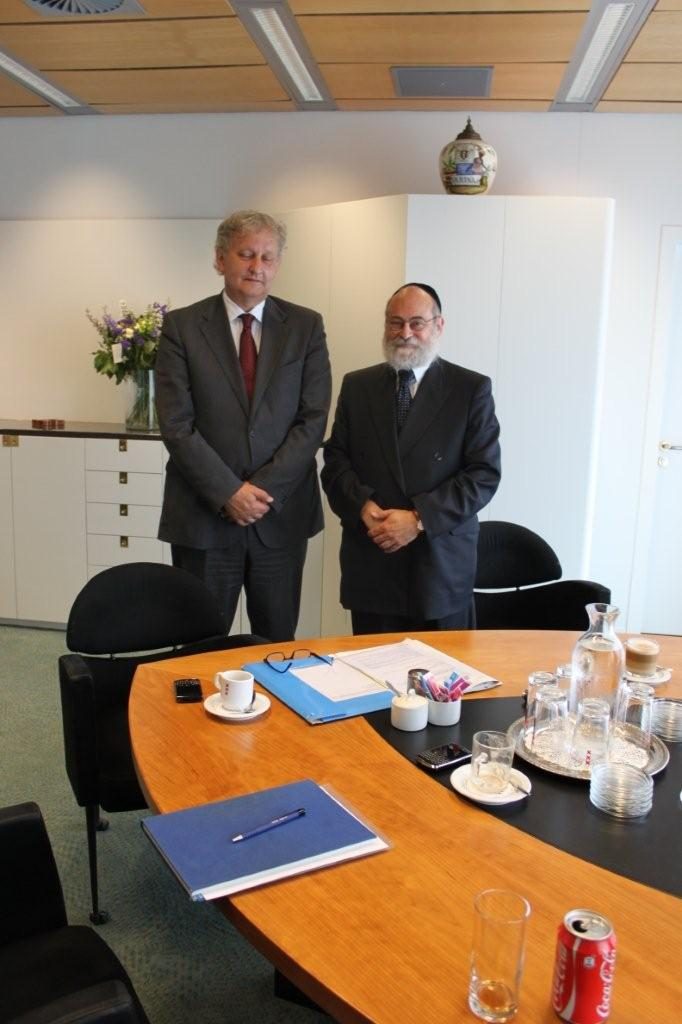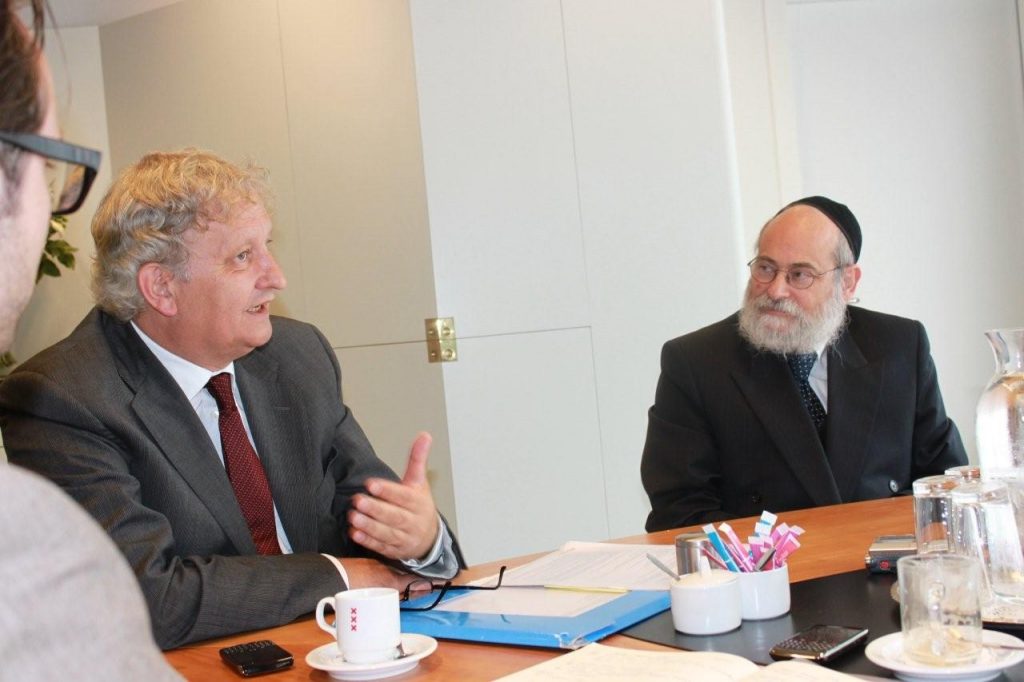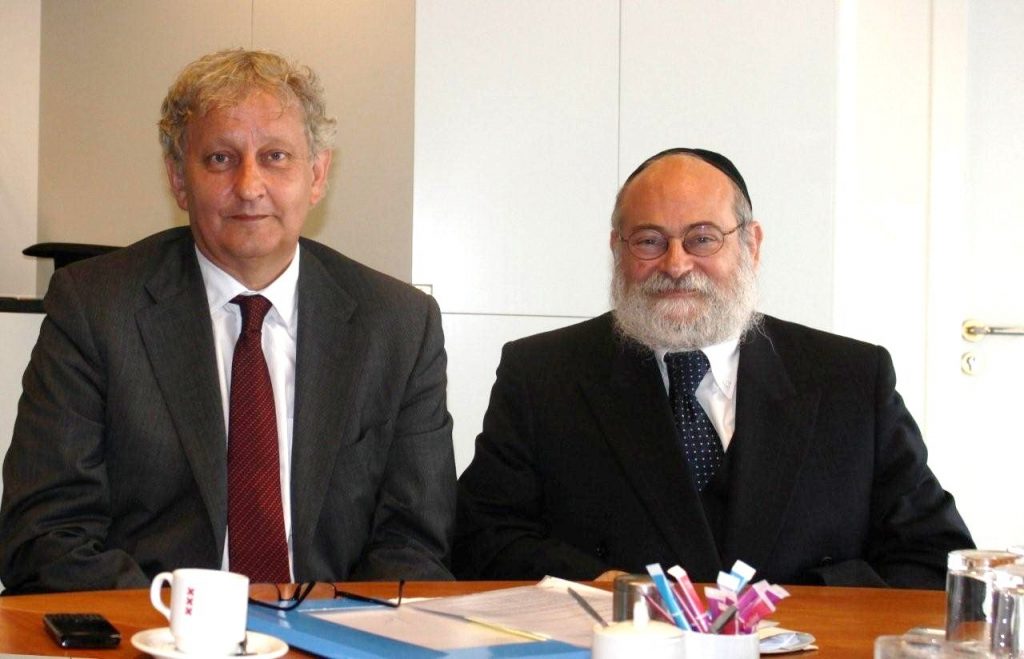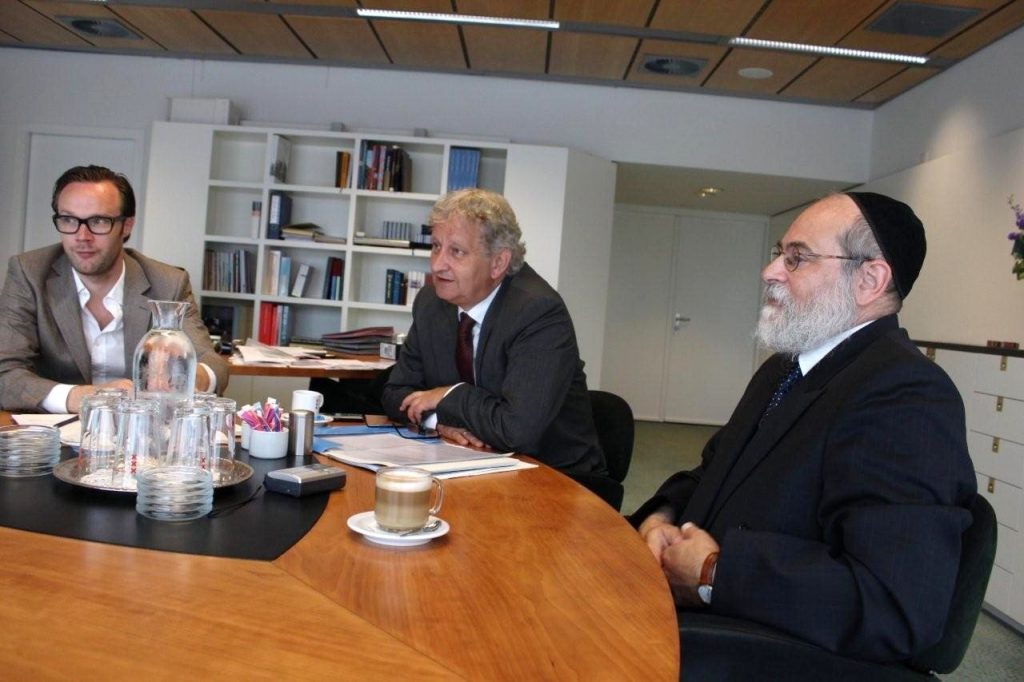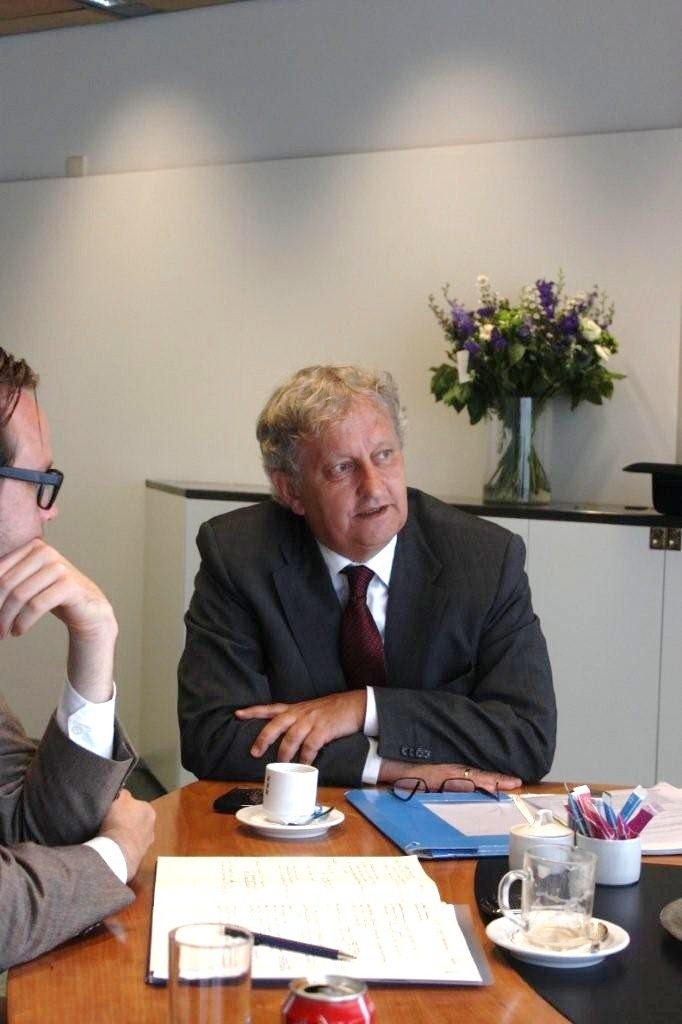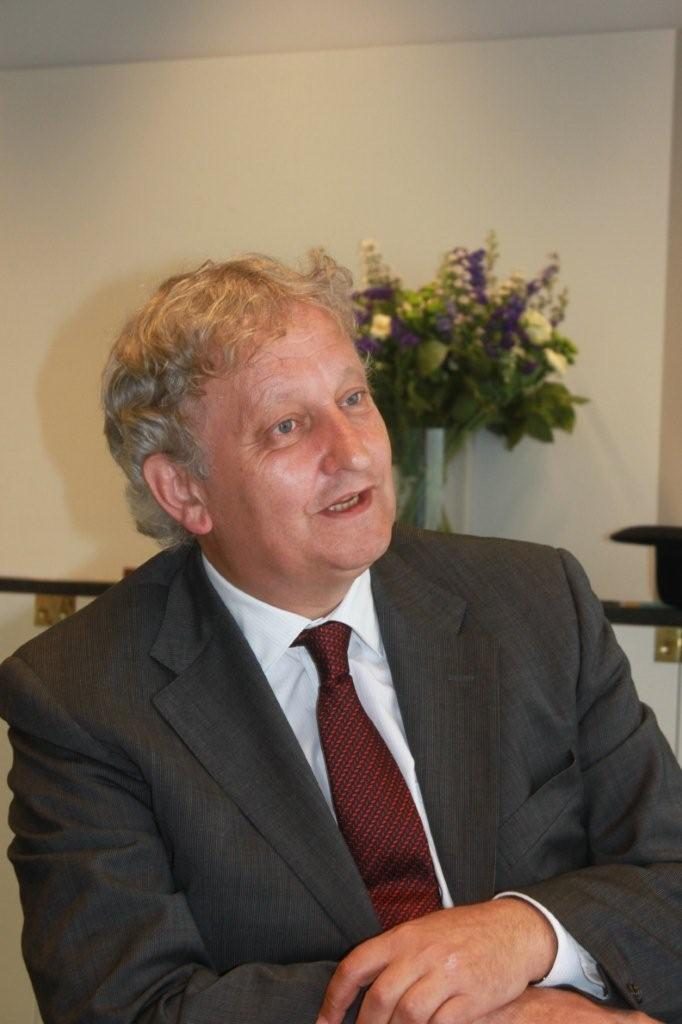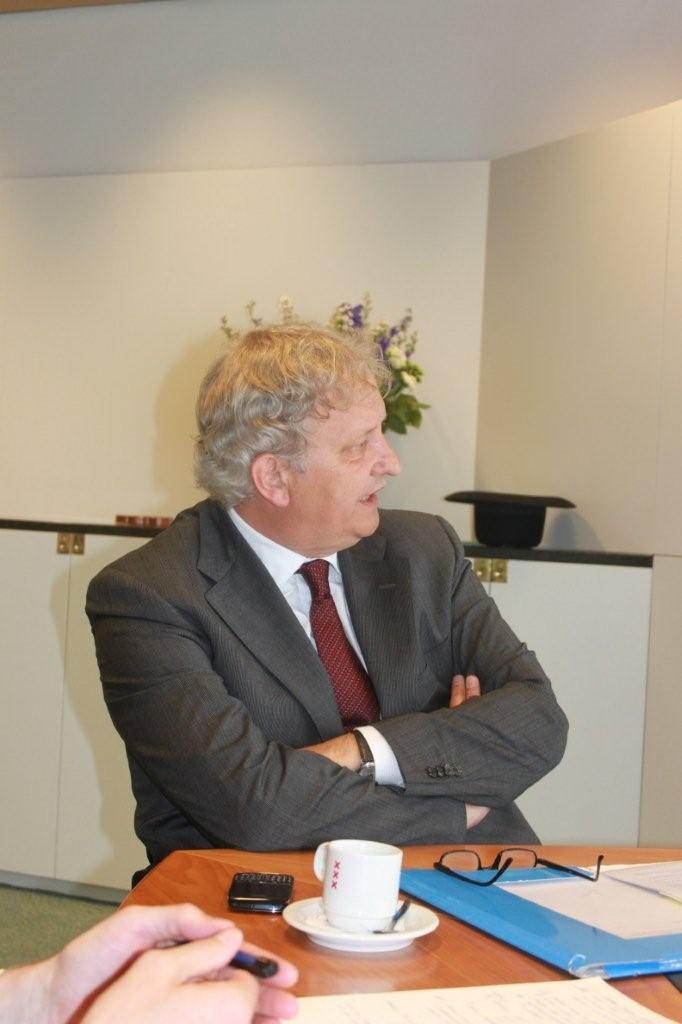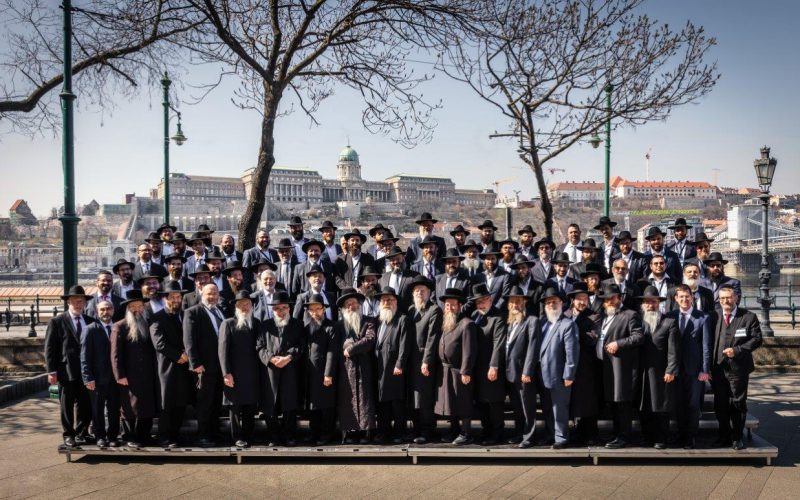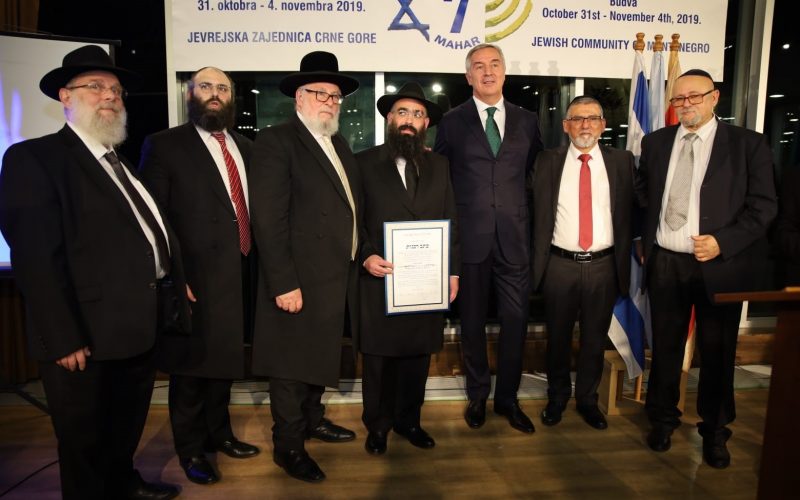Interview with the Mayor of Amsterdam
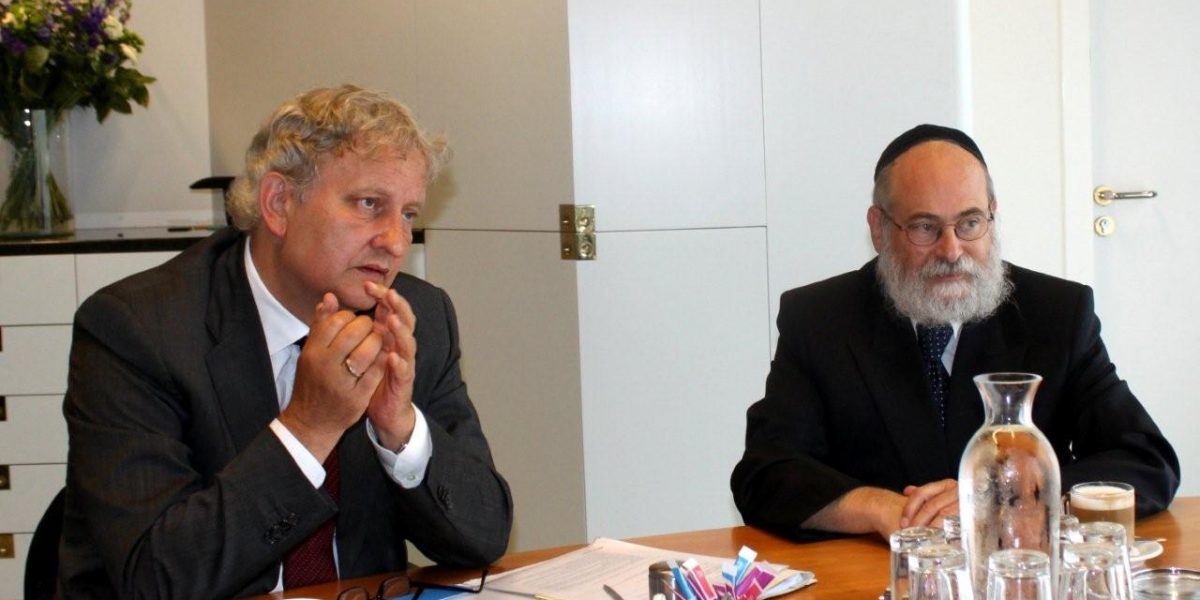
The city hall of Amsterdam is situated in the very heart of this sparkling capital, with busy canals peacefully flowing onward. Hundreds and thousands of bicycles are parked along the numerous picturesque bridges. Nowhere else in the world can so many bikes be seen together. Along those canals, houseboats are moored besides each other and carried gently up and down with the current, never to move away. Amsterdam’s persistent housing shortage explains this most uncommon sight. On our way to the city hall, busy daily markets are bustling with open-air stalls while their owners – as varying in color as their merchandise – are moving about, half asleep. After having walked through a labyrinth of corridors and joined by Rabbi Binyomin Jacobs, Chief Rabbi of the Inter-Provincial Chief Rabbinate of Holland, we are finally to meet the new mayor of Amsterdam, Eberhard van der Laan, who kindly lets us into his office, precisely on schedule. We thank the mayor for allotting us of his precious time for this interview with Kehilot, mouthpiece of the Rabbinical Centre of Europe (RCE).
Kehilot: In the name of the European Rabbis, we wish you a lot of success in your new position. You declared having the most fantastic job in the world. Why is that?
Eberhard van der Laan: Indeed, I’m thrilled with this job. The funny thing is that I never dreamt of ever becoming a mayor. The excitement is not just to have become a mayor, it is Amsterdam which does it for me. Being mayor of Amsterdam is truly “˜the top’. You are sitting in front of a very chauvinistic mayor. But that is, of course, a must.
Kehilot: Before the war, Amsterdam was known as “˜Jerusalem of the West’. Not much is left of it, and the scarce survivors are disappearing. This very city hall is located on the spot where the heart of the Jewish community was beating. How do you feel about that? Should we let all this become history or is it an inheritance to cherish forever?
Eberhard van der Laan: This is an easy one. It belongs of course to history. But it is to be kept alive, to be a steady well of inspiration. You are right to say that this was the Jewish quarter. It was the area where mainly the poor Jews lived. They were hurt very badly. I recently had a discussion about the “Uilenburger Shul”; it was the local shul in this neighbourhood, and the most horrible fact is that 98% of the people attending that synagogue died, were murdered. It’s a very important point that all this is not just to become history, it has to stay a living memory. Amsterdam owes a tremendous amount of gratitude to its Jewish citizens. They have contributed a lot of knowledge, entrepreneurship, spirit. It was not called “˜Jerusalem of the West’ in vain. For me, it is still that way, and, though immeasurably damaged, it will be so forever.
Kehilot: Your acquaintance and friendship with Chief Rabbi Jacobs was born out of a negative “˜experience’ or “˜collision’ with the Jewish community? What did exactly happen and why was it so essential to you? Was the Rabbi able to help you?
Eberhard van der Laan: The ‘collision’ obviously didn’t happen with Rabbi Jacobs, he was the one who helped me to straighten it out together with my friend Sunny Leons and other friends. A high factor of misunderstanding and bad luck played their part here. I was cited diametrically opposite of what I had meant. I was talking about something that bothered me for years and maybe decades. I would call it the “˜banalization’ of the war. My message was that you should never stop remembering and learning lessons from the war. I also added that you don’t have to quote the war endlessly, because it wears off, it loses its power, which must never happen. It is too horrible to ever be forgotten. Some people claim that the war occurred sixty-five years ago, so it can retire already – my idea was that the “˜commonization’ can retire. The premature and wrong press report caused a big commotion, before it even had time to be officially confirmed. But it all ended with a happy note, with the help of among others, the chief rabbi. It was all settled beautifully and, moreover, I gained some new Jewish friends out of the experience. The Jewish community even had the decency to apologize for the misunderstanding. All is well that ends well.
Kehilot: Both your parents were active in the Resistance. Were they working together? How did this heroic past influence your childhood or youth? You still have very young children; what are they going to remember from all this?
Eberhard van der Laan: My parents were married in 1938. I was born in 1955, so personally, I wasn’t involved in anything. But I’d like to tell something peculiar that struck me. My mother was a scared person, my father on the contrary, had a rather adventurous personality. So, even as a child, there was something I already understood: “Courage is not the absence of fear, but the capability to handle it” (Ambrose Redmoon, cit). And if you consider it under that angle, my mother was a much bigger hero than my father. He was probably more impulsive, or just carved out of other wood. My mother was petrified, but still, she joined her husband. This is veritable courage. I come from a big family, we were six siblings, and we talked a lot about the war. My parents had kept a lot of friends from that period. The friendships from those shaky times are built to last a lifetime. But also the wounds that were inflicted last forever. After each 4th of May memorial, my father goes into the garden to weed or pretend to weed. My mother just sits down and weeps, while remembering all that has been lost. That was an annual phenomenon that struck me really hard as a child. I hope that my children will also gather the important lessons that are to be drawn from those times. I learned from my parents many things that originated from wartime and you should put it to good use on many occasions. As I have discussed several times with Rabbi Jacobs, it must be said that whether you got involved with the Resistance was sometimes merely a matter of coincidence. There was infernal terror all over at the time, and it may be too easy to judge people over half a century later. It was not an evidence to row against the tide. Even more admirable it is that at a given moment, people from all walks of life got up and said: “No more. Enough!” Men and women who didn’t have the means financially or otherwise, just plainly risked their own lives to protect others. If those facts were to be transposed into the present and our children would have someone who is bullied in their class, they would have to react. The lesson to be drawn is that even being at such high risk, your plight is to intervene. If our children are capable of reasoning that way, we have achieved something.
Rabbi Jacobs: There is a wide array between helping the Resistance and collaborating with the enemy, between being totally idealistic or simply apathic about what is going on. The main danger is always that there is a kind of “˜flock-behaviour’ developing, which often leads to the most horrible situations.
Eberhard van der Laan: I think the right-minded people will ultimately always stand together and not cross certain lines. That is how I see things, but we have to work with people to be able to activate this reaction at the right time. I’m remaining optimistic. While visiting some neighbourhoods, I realized that listening and being open to people’s complaints and problems, and letting them know that we are all in this together, and whatever it be, we’d find a solution – in 95% of the cases, really works. Anyway, we must remain vigilant and keep investing in people. It is a never ending battle.
Kekilot: At WWII-memorials, speakers tend to elaborate more and more about related problems as racism, minorities, wars, etc. Is this a positive evolution or doesn’t that relegate the remembrance of the victims to a fraction of a general problem?
Eberhard van der Laan: The latter must never happen. Let me point that out clearly: what happened is so horrific, the worst thing that happened in the history of humanity. This must never be overshadowed by anything else, even with the best of intentions. It is something unique and has to stay clearly so in everyone’s memory. But at the same time, it is important that we should glean the lessons of it. We have to react very strongly to every case of discrimination, without never letting this tarnish any memory from this monumental crime against humanity.
Kehilot: Holland is proud to be a multicultural society. Does this mean that everything should become a unity, a cultural melting pot, or is it essential that every entity should preserve their own identity and originality? What is to be done about the rise of anti-Semitism?
Eberhard van der Laan: Let me answer those two questions one at a time. No, of course we don’t want a melting pot. As minister of integration, I already explained that if people move to another country, they have to learn the language and the rules to be able to function in their new environment. That has always been so and is universally admitted. But meanwhile, be proud of your origins. That should be your inspiration. I was once shown a booklet of little children telling about their roots. Fantastic stories that give those children that extra identity. In one story a boy relates how his grandpa dealt with tigers in Indonesia, in another one, a girl explains some cooking styles fromֲ² Egypt. That is so great. Above all, let them be most proud of it. But it is also essential that they learn the language to be able to partake in the local lifestyle. Once you have moved into a country and have had children, it is imperative to wonder what future you want to offer them. This implies accepting certain consequences to help your children, so as not to send all your savings to your country of origin. Invest in your children’s education, offer them facilities to help build them a future with equal chances. Here you find a few dilemmas that are not to be solved with a one-dimensional solution, it asks for a lot of nuances. It is a complex situation where different cultures can live next to each other, not necessarily be aware of this most of the time, but still have to learn to cooperate and communicate when the circumstances require it.
Rabbi Jacobs: Respect is also essential.
Eberhard van der Laan: Of course, respect as well. Most evidently, discriminating each other is totally out of the question. But if people are communicating, there will be a mutual interest and I’m optimistic enough to believe that this is going to resolve a lot of problems. When you can look further than the differences, achieve goals together, things will change. It is essential for people to meet and communicate. That is integration.
Kehilot: Concerning the compulsory integration courses for immigrants, Rabbi Jacobs suggested to include “˜tolerance and respect’ as an inseparable part of the lessons. The acceptance of the multicultural society would thus become a stringent condition to stay in the Netherlands. At the same time, tolerance should be taught in school, maybe even as a separate topic.
Eberhard van der Laan: The Rabbi is totally right. Tolerance begins in school, but even more so at home. There the children have to see that it is an obvious state of mind. In the integration courses we could make that clear from the start to people who come from other countries where this is not so evident. This happens already, but we should officialize it. Experience shows us that what is obvious for us is not always understood as such in other cultures. I don’t think we have to overemphasize the importance of the schools. What happens at home is vital, and we have to work on this. Because even if discrimination or the like happens only once, it is one time too many. We should also be very alert to give children equal chances, because if certain population groups feel that they are not getting chances, not becoming integrated enough, it will obviously cause problems. I’ve heard of many little children arriving at school at age four without any knowledge of the language whatsoever. Those children start their school career with two years leeway and they become backward pupils. Such situations have to be avoided at any price. It is criminal to launch little children into life with the worst prognosis. But luckily, the tide seems to be turning and more and more parents of foreign origin are now mastering our language when their children start schooling. Sadly enough, the youth that is now making problems, are the result of that generation that didn’t get a genuine chance.
Rabbi Jacobs: I think we have to emphasize that we are not only talking about foreign youth.
An interesting fact is, that the founder of the “cheider”, the Jewish day-school, Mr. Adje Cohen, who by the way was a fighter with the Resistance as well, also founded a school for Islamic children. The school didn’t last for long, for different reasons, but the idea behind it was to make those children feel at home so as not to lose them on the street.
Eberhard van der Laan: We are trying to give the people the feeling that there are limits that are not to be crossed. Discriminatory behaviour will just not be accepted, towards anybody. And in my short time as a mayor, I’ve been able to see that the Amsterdam police is indeed reinforcing this idea without any compromise.
Kehilot: The two Jewish day-schools in Amsterdam, the only ones in Holland, have a perpetual shortage of pupils. The Jewish population is not really growing. How do you consider this?
Eberhard van der Laan: The national legislation is in charge of those problems. It is not under communal jurisdiction. But it is important to realize as a person and as a leader that this problem is consequence of the Holocaust. Of course, this is at all times to be kept in mind. I can’t imagine any leading person in Holland who would be blind to this consideration. This is my answer, regarding the attitude to adopt. But as I said, this matter is not in my competence. I’m always there to help when my concern is wished for. These children are also my citizens, and I have to see that they get proper care.
Rabbi Jacobs: Do you think European Jewry can survive? Wasn’t it too damaged?
Eberhard van der Laan: I am astonished of the question, because for me there is no doubt about it. European Jewry has already shown its capacity to survive and remains a universal factor of inspiration. In this city in particular, everybody feels the Jewish legacy in humor, esprit and on so many other different levels. My optimism, obviously backed by a sense of responsibility, will hopefully be of support to you.
Kehilot: As you probably know, Rosh Hashana, the Jewish new year, is approaching. What wishes would you like to convey to the European rabbis, to European Jewry?
Eberhard van der Laan: I think it would be rather arrogant to present my wishes to rabbis who stand in a three thousand year old tradition. I don’t feel wise enough to offer them my message. But if I may pass something, they obviously have such strong power and they represent so much that has been given to us, that if you consider all the tragedies that have taken place, I wish that they may keep this power for another few thousand years, with happiness and peace. They really are entitled to it. I hope that with my optimism, I can contribute to the peace in this city. Inspired by their power, we will hopefully do the right thing. Peace in capital letters, positive power is what I wish them, with all the humililty that befits me, a little boy who hasn’t seen much yet.
Kehilot: To conclude, I refer to your reputation of being a good “˜bridge-builder’. How is that?
Eberhard van der Laan: I have to be. We have a few hundred bridges in Amsterdam (laughs), but indeed; our city has so many different inhabitants of so many different social backgrounds, opinions and cultures. We have merchants, workers, so many religions. We have to make it work and we will. I, for one, will surely do my best.
